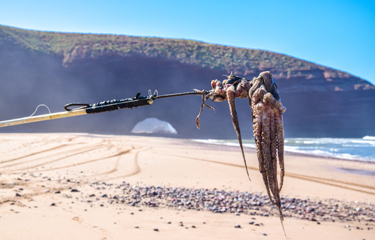A scientific report by Morocco’s National Institute for Fisheries Research (INRH, per its French acronym) indicates the nation's cephalopod catch is down by 60 percent, most significantly in the southern part of the country, according to Morocco-based news site Le Reporter.
According Le Reporter, word in the industry is that the current decline is due to poaching by an “octopus mafia.” There has been lax enforcement of the ban on fishing during the biological rest period, and the longstanding issue of smuggling of illegally caught octopus continues unabated.
The INRH report was released on 24 May during a meeting of the country’s octopus-fishing committee. The committee went on to push back the summer octopus season by a month, from 1 June to 30 June, due to the reported decline in the local octopus population.
Morocco, Mauritania, and Senegal are major exporters of octopus, primarily to Asia and Europe. The Moroccan octopus stock crashed due to overfishing in 2003, and the committee said it would like to avoid a repeat of that situation. Morocco has uncovered octopus-smuggling rings in the past, but the country's spotty enforcement record has not been enough to deter criminal activity, according to Le Reporter.
In response to the decline in the local octopus stock, a select committee of professionals and members of the Moroccan Ministry of Fisheries was created during the commission meeting to recommend countermeasures to combat illegal fishing and sales of octopus, and the commission on 25 May decided formally requested government intervention to prevent illegal fishing during the current fishing moratorium.
“Yes or no, are we going to let this octopus mafia continue to indulge in the illegal traffic in full view of everyone?” Moroccoan Secretary General of the National Confederation of Coastal Fisheries Mohamed Allalou said.
Allalou said the Moroccan government isn’t doing enough to stop illegal octopus fishing, and urged enforcement of registration requirements for fishing boats.
In Dahkla, a fishing center in southern Morocco, Le Reporter heard accounts of poaching vessels with advanced fishing gear and multiple engines, and it reported the local black market is carried on with the complicity of local government administrators. The illegally caught octopus is trucked to cold storage in northern ports, and fake invoices are obtained from fish markets regulated by the Office d’exploitation des Ports – the harbor authority. With these, they can obtain phytosanitary certificates for export.
Despite the current biological rest period, Morocco's cold storage facilities continue to buy octopus and are currently full, according to Le Reporter.
“The freezing units, which buy the octopus caught during the stoppage of activity, are now full of fish. These units should normally be more strictly controlled during the period of biological rest,” an anonymous source told Le Reporter.
Morocco has made an effort to expand its fight against illegal, unreported, and unregulated (IUU) fishing. In February 2022, Morocco Prime Minister Aziz Akhannouch committed the country to expanding its marine protected areas and doubling the resources available to fight IUU.
But Allalou is calling on the government to do more to combat the current illegal fishing.
“What we are asking for is strict control, and above all urgent intervention by all the authorities concerned,” Allalou said. “Because the more this mafia gets involved in illegal octopus fishing, the more difficult it is to put an end to this problem.”
Photo courtesy of tenkl/Shutterstock







